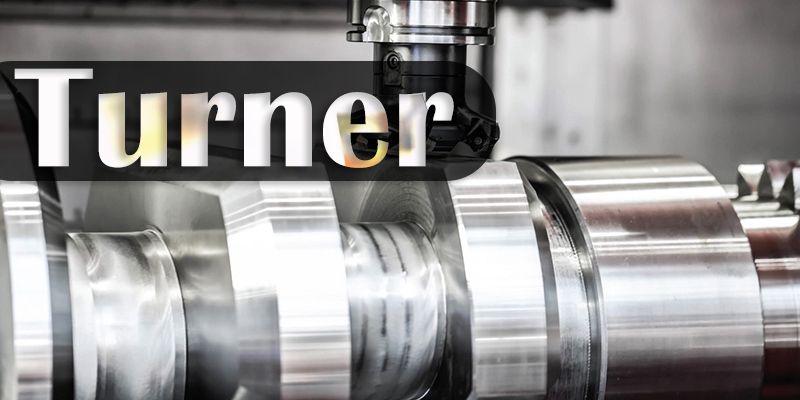iti
15 April 2025

ITI Turner Syllabus (English)
Course Overview
- Trade Name: Turner
- Duration: 2 Years (4 Semesters)
- NSQF Level: Level 5
- Eligibility: 10th Grade Pass with Science and Mathematics
- Objective: To train candidates in operating lathe machines, shaping metal components, and performing precision machining, preparing them for roles as turners, machinists, or CNC operators in manufacturing, automotive, or maintenance sectors, or for self-employment in machining services.
- Certification: National Trade Certificate (NTC) by NCVT
Detailed Syllabus
Semester 1
Trade Theory
- Introduction to Turning: Role of turning, types of lathes (center, turret, CNC), applications in industry.
- Safety Practices: Machine safety, PPE (goggles, gloves), fire hazards, first aid, workshop ergonomics.
- Workshop Tools: Vernier calipers, micrometers, gauges, files, chisels; usage and maintenance.
- Lathe Machine Basics: Parts (bed, headstock, tailstock), specifications, lathe accessories (chucks, tool posts).
- Cutting Tools: Types (HSS, carbide), geometry, tool angles, tool sharpening methods.
- Materials: Ferrous (steel, cast iron) and non-ferrous (aluminum, brass) metals; properties and uses.
- Engineering Drawing: Reading blueprints, orthographic projections, machining symbols.
Trade Practical
- Safety Drills: Using PPE, practicing machine shutdown, handling minor injuries.
- Tool Handling: Measuring with vernier calipers/micrometers, filing flat surfaces, sharpening chisels.
- Lathe Setup: Aligning workpieces in 3-jaw/4-jaw chucks, setting tool posts.
- Basic Operations: Facing, plain turning, step turning, chamfering on mild steel.
- Measurement Practice: Checking workpiece dimensions, ensuring tolerances (±0.05mm).
- Drawing Interpretation: Reading simple machining drawings, marking workpieces.
- Project Work: Machining a mild steel shaft with step turning and chamfering.
Hours: Theory: 160 hours | Practical: 240 hours
Semester 2
Trade Theory
- Advanced Lathe Operations: Taper turning, thread cutting, knurling, drilling, boring; principles and techniques.
- Lathe Accessories: Steady rest, follow rest, mandrels, collets; applications and setup.
- Cutting Fluids: Types (oil-based, water-based), functions, coolant application methods.
- Speed and Feed: Calculating spindle speed, feed rate; effects on surface finish.
- Heat Treatment: Annealing, hardening, tempering; impact on machining.
- Welding Basics: Arc welding, gas welding; relevance to machining repairs.
- Quality Control: Inspection methods, tolerance limits, surface finish standards (IS/ISO).
Trade Practical
- Taper Turning: Machining external/internal tapers using compound rest or taper attachment.
- Thread Cutting: Cutting V-threads (metric/BSW) on mild steel rods, checking with gauges.
- Knurling and Drilling: Applying knurling patterns, drilling center holes on lathe.
- Boring Practice: Boring cylindrical holes, ensuring dimensional accuracy.
- Coolant Application: Using cutting fluids during high-speed turning, maintaining flow.
- Inspection Tasks: Measuring threads, tapers with gauges; verifying surface finish.
- Project Work: Machining a steel component with taper, threads, and knurling (e.g., bolt).
Hours: Theory: 160 hours | Practical: 240 hours
Semester 3
Trade Theory
- Special Lathe Operations: Eccentric turning, multi-start threads, form turning; applications.
- Jigs and Fixtures: Types, design principles, use in precision machining.
- CNC Lathe Basics: CNC machine components, G-codes, M-codes, coordinate systems.
- Tool Maintenance: Grinding tools, balancing tool holders, preventing tool wear.
- Metrology: Advanced measuring instruments (dial gauges, CMM), calibration techniques.
- Production Planning: Job scheduling, material estimation, minimizing machining time.
- Maintenance Practices: Lathe lubrication, belt alignment, preventive maintenance.
Trade Practical
- Eccentric Turning: Machining off-center components, ensuring balance.
- Multi-Start Threads: Cutting double-start threads, verifying pitch accuracy.
- CNC Introduction: Setting up a CNC lathe, running simple G-code programs (facing, turning).
- Tool Grinding: Sharpening HSS tools on bench grinders, checking angles.
- Metrology Practice: Using dial gauges for runout, measuring with slip gauges.
- Maintenance Tasks: Lubricating lathe bed, adjusting tailstock alignment.
- Project Work: Machining a complex component with eccentric turning and multi-start threads.
Hours: Theory: 160 hours | Practical: 240 hours
Semester 4
Trade Theory
- Advanced CNC Machining: CNC programming, tool path optimization, CAD/CAM basics.
- Specialized Turning: Turning hard materials (stainless steel, titanium), high-precision jobs.
- Troubleshooting: Diagnosing lathe faults (vibration, chatter), tool breakage analysis.
- Automation Trends: Industry 4.0, IoT in machining, smart lathes.
- Entrepreneurship: Starting a machining workshop, costing, market trends in precision components.
- Environmental Practices: Recycling metal chips, reducing coolant waste, energy-efficient machining.
- Quality Standards: ISO 9001, Six Sigma basics, ensuring zero-defect production.
Trade Practical
- CNC Programming: Writing and simulating G-code for complex shapes (contours, grooves).
- Hard Material Turning: Machining stainless steel components, optimizing tool life.
- Troubleshooting Tasks: Correcting lathe vibrations, replacing worn belts, recalibrating chucks.
- Automation Practice: Testing IoT-enabled lathe features (e.g., remote monitoring).
- Field Exposure: Hands-on training in machining shops or manufacturing units (4-6 weeks).
- Quality Inspection: Using CMM for precision checks, documenting defects.
- Project Work: Producing a precision component (e.g., gear shaft) using CNC lathe with full inspection.
Hours: Theory: 160 hours | Practical: 240 hours
Additional Components
- Workshop Calculation and Science
- Calculations: Taper angles, thread pitch, cutting speed, machining time estimation.
- Science: Mechanics of metal cutting, friction, thermal effects in machining.
- Hours: 80 hours/year
- Engineering Drawing
- Drawings: Detailed machining drawings, sectional views, tolerance annotations.
- Hours: 80 hours/year
- Employability Skills
- Communication: Technical reporting, client interaction, teamwork.
- IT Literacy: Using CAD/CAM software, CNC simulators, online machining resources.
- Soft Skills: Time management, resume writing, interview preparation.
- Hours: 60 hours/year
Assessment and Certification
- Exams:
- Theory: Written exams per semester (MCQs, descriptive questions).
- Practical: Tasks like turning components, thread cutting, CNC programming, inspections.
- Evaluation Criteria: Machining accuracy, tool handling, safety adherence, quality compliance.
- Certification: NCVT National Trade Certificate (NTC) upon passing all semesters, globally recognized.
Career Opportunities
- Employment: Turner, machinist, CNC operator in manufacturing, automotive, or aerospace industries.
- Self-Employment: Machining workshop, precision component supplier, tool repair services.
- Further Studies: Diploma in Mechanical Engineering, certifications in CNC programming or CAD/CAM.
Trade Type
- 609 views